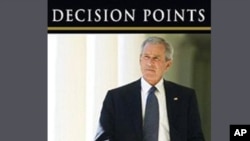After remaining largely out of the public eye since leaving office last year, former U.S. President George W. Bush has put himself back in the spotlight. He is appearing in a flurry of television interviews this week to promote his new book, Decision Points, which will be released on Tuesday.
Former President Bush is appearing this week on NBC television's Today show, on Oprah Winfrey's talk show and on Fox News.
Mr. Bush has also put out a video explaining why he wrote the book.
"I wanted to give readers a glimpse of the presidency from my perspective," said Mr. Bush. "That meant focusing on the most demanding part of the job - making decisions."
The decisions stretch back before Mr. Bush's presidency, before he was governor of Texas, to the mid-1980s when he quit drinking with the help of religion. Mr. Bush writes about his response to the 2001 terrorist attacks against the United States and what he calls the hardest decision any president can make - deploying troops in combat.
"I discuss the difficult decisions to keep our homeland safe, our successes and setbacks on the battlefield," said George W. Bush.
The former president says he was "blindsided" by photographs of detainee abuse by U.S. military personnel at Abu Ghraib in Iraq, and "shocked" that no weapons of mass destruction were found in Iraq.
Mr. Bush says Dick Cheney offered to resign in 2004, but that he asked the Vice President to stay on.
Mr. Bush says the lowest point of his presidency was after Hurricane Katrina, when a hip hop musician said, "George Bush doesn't care about black people."
Some people who know the former president say he is deeply troubled that many Americans across the political spectrum have a negative view of him.
Doug Wead was an advisor to the former president in the years leading up to his election in 2000. He says Mr. Bush is sensitive to criticism.
"But more than anybody I've ever met in my life, he can let negatives roll off his back," said Wead. "But this had to hurt really deep."
Historian Robert Dallek has written extensively about U.S. leaders since World War II. He says he expects to find little that is new in Mr. Bush's book. Dallek spoke by cell phone from an airport at the start of a tour to promote his latest book.
"And with this administration in particular [the George W. Bush administration], he [Mr. Bush] was under very heavy criticism," said Dallek. "And so I guess the fact that he brings the book out within two years of his presidency is not surprising. He wants to get out in front on justifying what he did."
Dallek says a better picture of the Bush administration will emerge when historians get access to the presidential archives.
There will be a presidential library at the George W. Bush Presidential Center. Next week, Mr. Bush will attend a groundbreaking ceremony for the center in Dallas, Texas.
Jane Hampton Cook worked for Mr. Bush when he was governor and president. She says he is trying to influence his legacy while staying out of the political fray.
"He made a commitment not to talk about the current president, to keep his mouth shut, to stay out of it," said Hampton Cook. "And that's probably why the timing of his decision to come and talk about his own presidency has come after an election and way, way, way before the next election."
And the former president seems determined to stay on the political sidelines. In an interview with Oprah Winfrey, Mr. Bush was asked about former vice presidential candidate Sarah Palin's chances for a White House bid in 2012. Mr. Bush responded: "You're asking me to wade back into the swamp."




